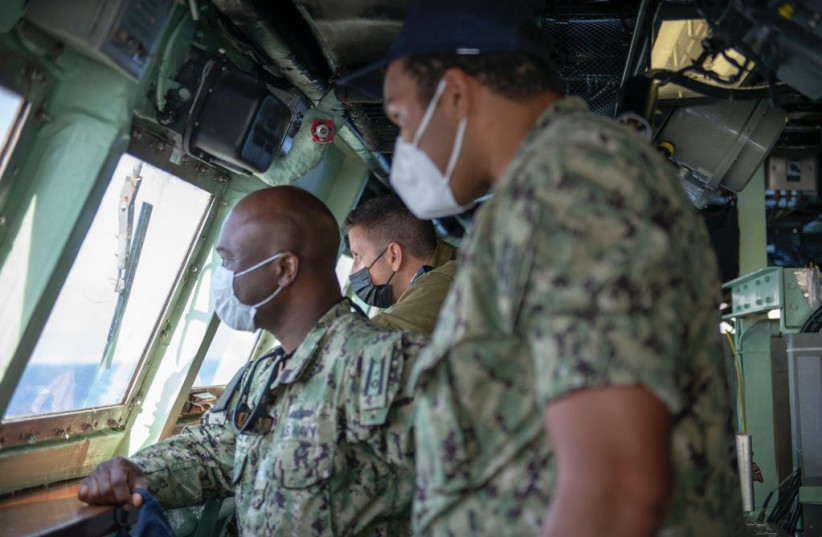The commander of the US Naval Forces Central Command’s (NAVCENT) 5th Fleet visited Israel this past week, meeting with senior officers and discussing mutual maritime threats.
During the visit, Charles B. Cooper II held a series of meetings and briefings with Defense Minister Benny Gantz, IDF Chief of Staff Lt.-Gen. Aviv Kohavi, Commander of the Israel Navy V.-Adm. David Saar Salama, IDF International Cooperation Division head Brig.-Gen. Effie Defrin and others.
Saar Salama called the visit by Cooper “very significant.”
“The talks that took place led to significant progress in the common issues that concern the State of Israel and the United States alike,” he said. "The Fifth Fleet, led by V.-Adm. Cooper, is an important strategic partner of the Navy. The Fifth Fleet and its people are committed to the security of the State of Israel, and we are mutually committed to them."
The visit comes as a result of the transfer of the responsibility for Israel from the US Europe Command (EUCOM) to the US Central Command (CENTCOM).

“Our commitment to Israel is unwavering and this visit highlighted the importance of our decades-long strategic relationship,” Cooper said. “The recent alignment of Israel to US Central Command opens new opportunities to deepen our naval ties and enhance regional maritime security and stability.”
According to R.-Adm. Daniel Hagari, head of Naval Operations in the Israel Navy, the move to CENTCOM “has a major influence over the activity of the Israel Navy and widens our scope of responsibility in the maritime domain.”
“The transfer to the Central Command has allowed us to continue our coordination in the region, and to collaborate with maritime coalitions in the area,” he said.
“Therefore, the security coordination between our forces in the fields of threat elimination, neutralization, interception and sabotage have become more valuable and intimate,” Hagari said, adding, “We have opened a new door for the strengthening of regional maritime security together with our partners.”
It is believed that the move will not only simplify cooperation with American troops in the region but can also create the potential for a regional coalition with Arab countries that have normalized ties with Israel against shared threats posed by Iran.
The 5th Fleet has clashed with Iranian vessels in the Persian Gulf, and Cooper’s visit can be seen as a message to Tehran.
“The cooperation between NAVCENT and the Israel Navy crosses many fields, but at its core, we have joint collaboration in the mapping domain as well as maritime threat detection and elimination,” Hagari said.
The Abraham Accords have led to important developments that “have many social and economic opportunities, but military ones as well," according to Hagari. "The maritime domain can be used as a dimension for overall maritime security with the countries that share access to the sea.”
Cooper’s visit to Israel, which is his second since assuming his position in May, came shortly after he hosted Foreign Minister Yair Lapid in Bahrain last week where Israel, American and Bahraini officials discussed regional maritime security cooperation.
The US 5th Fleet’s area of operations encompasses some 2.5 million square miles and includes the Arabian Gulf, Gulf of Oman, Red Sea, parts of the Indian Ocean and three critical choke points at the Strait of Hormuz, the Suez Canal and the Strait of Bab-el-Mandeb.
With the addition of Israel, the region now comprises 21 countries.
